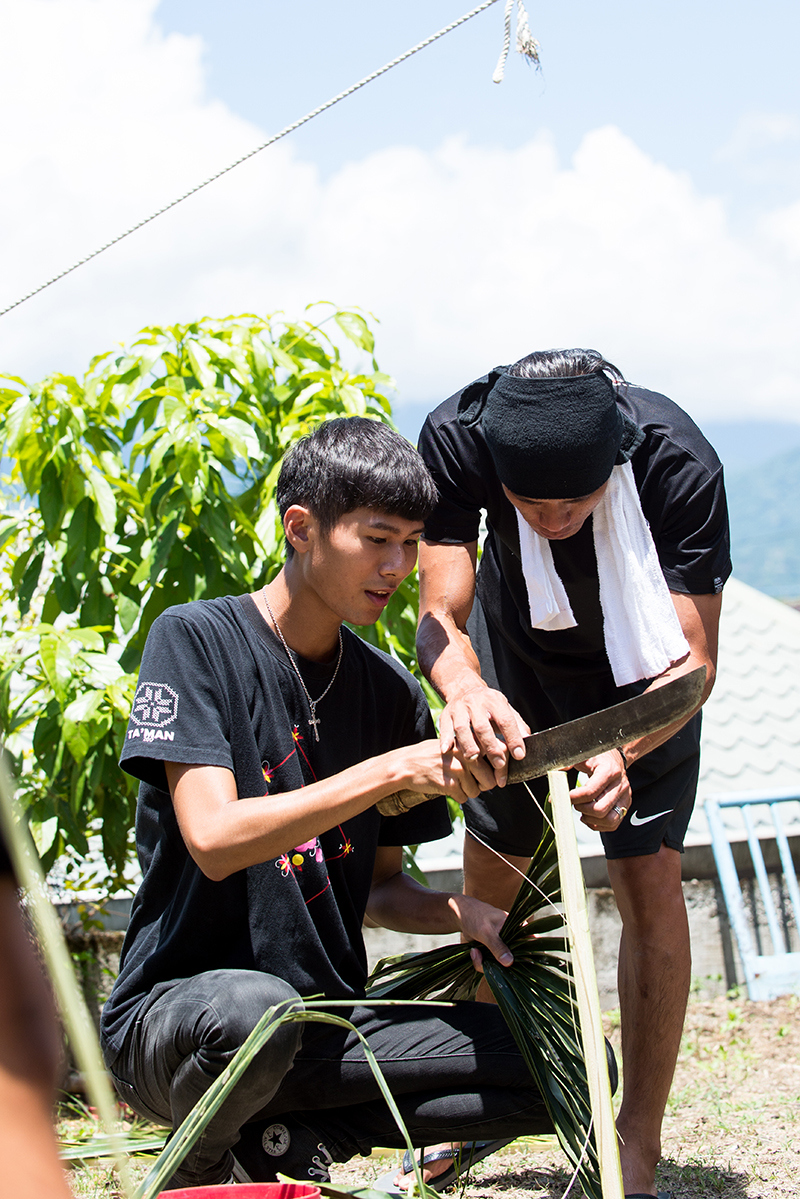Above: National Dong Hwa University Pangcah club students learn about traditional arts and skill in Angcoh Community.
Angcoh Community, a typical mini Pangcah community hidden next to Siouguluan River in the East Rift Valley. There are only 100 households in the quiet community, forming a strong contrast to the bustling Yuli City nearby.
A group of visiting students breaks the serenity. They pick up nearby coconut leaves and start to weave beautiful headbands. Later when the students form a circle, the diamond patterns on their headbands form a single endless chain. “This carries three meanings.” explains Asaw Siwciyang, a young instructor from Angcoh Community, “one is solidarity, two is defense - the diamonds are like chains that can stop evil spirits, the third is inclusion, because we are all family.”
Pangcah youth Asaw Siwciyang returns home to teach courses and let more people understand the unique Pangcah culture and its meaning.
Reclaiming
the Long-lost Community Culture
Asaw, who now teaches traditional indigenous arts and skills, was still a city boy living in Taipei five years ago. Raised in Taipei by his parents, Asaw's only memories of his community were living with grandma in the community when he was still in kindergarten, and freely playing outside. However, he was not very familiar with the community's culture.
Asaw's first job in Taipei was at an aluminum window factory. On his first day, the first sentence the Deputy Factory Director spoke to him was "you are a mountain boor". This deeply affected Asaw. To break the public stereotype on indigenous peoples, Asaw worked extra hard, took on extra shifts that his colleagues did not want to cover, and deliberately avoided drinking and chewing betel nuts in front of his colleagues.
While his boss was very impressed, the Deputy Director continued to pick on him. “He never called my name, it was always 'mountain boor'.” said Asaw. “When I worked hard, he would tell me to 'quit faking it'.” After tolerating him for six months, Asaw finally got into a physical fight with the Deputy Director. After the incident, Asaw quit the job. But the episode also made him think. “Actually, I probably can't even say I'm a ‘mountain boor’, because I don't really know much about my people's culture.”
It's not that Asaw never thought of returning to his community. Although he spent most of his life in Taipei, Asaw never really liked the fast, busy pace of city life. However, the lack of employment opportunities kept Asaw from realizing his dream of going home. The real turning point came in the form of his cousin. “His cultural awakening happened earlier than mine. He felt alone in Taipei, so he went back to learn about his own culture.”
His cousin first went to Cidal Hunter School in Shoufeng Township, Hualien, to learn the traditional arts and skills. Asaw later followed his cousin's footsteps and returned to Hualien at age 31. At that time, Asaw was working in the wooden floor business in Taipei with a monthly salary around NT 50,000 to 60,000. Nevertheless, “the day I decided I wanted to go home, I called my boss and told him I was leaving the job at the end of the month.”
In order to reclaim his long-lost community memories, Asaw also enrolled in Cidal Hunter School. Through hunting, fishing, weaving, and speaking the language, he gradually pieced together a full picture of his own culture. A year later, Asaw became a teacher. With a means to support himself, he could move back to Hualien to work and fulfill his dreams.

Students use coconut leaves to practise traditional weaving.
Carrying on
the Pangcah Community Spirit
But after awhile, Asaw's desire to return to his own village became stronger. “After all, this is not my community. I want to work in my community, and let more people know about Angcoh Community.” Asaw plans to go back to Angcoh Community and design a complete set of community courses after he leaves his current post this summer break. He wants to let more people understand Pangcah culture and experience Angcoh Community’s relaxing and easy lifestyle through activities such as fishing, hunting, and gathering.
“I hope the public can have a more in-depth understanding of Pangcah culture. It's not only about song and dance.” explained Asaw. For example, when the Pangcah have a toast, they will first stomp the ground, touch the cup to the earth, pull up the cup in a forward direction, and then pay respects to the elders. This simple gesture carries a lot of community culture in it: the Pangcah people consider the earth as their mother. By stomping the ground, they awaken the Earth Mother and offer her the first drink of wine. Pulling the cup forward is to collect blessings from the Mother, and then giving them to the elders. “So this cup of wine is very significant. It carries the blessings from the earth, it shows our respect towards the elders and teaches the younger generation respect.”
Community culture is facing the threat of discontinuity as some people think the traditional ways are not useful in the modern world. But Asaw takes it upon himself to carry on the traditions through his courses. “It's not about the form when it comes to culture and traditions, it's about passing on the meaning behind it and understanding how they teach us to become better people.”
Asaw also hopes that after he has the courses in place, it can create more job opportunities for young people to come back and work and live in their communities. Asaw plans to set up a Pangcah language school in the abandoned community elementary school so that the language will not be lost. No matter how long he was away from the village, Asaw's connection with his community has always been there. And from now on, he will begin his new community life here.




